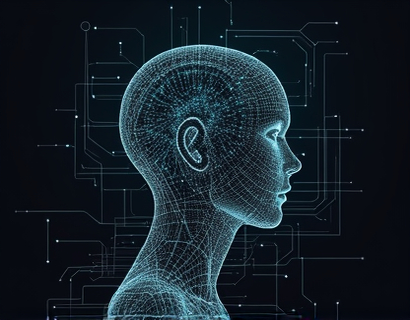Personalized AI Companions: Elevating Children's Creativity and Emotional Well-Being Through Interactive Digital Friends
In the rapidly evolving landscape of technology, AI-driven imaginary friends are emerging as a transformative force in childhood development. These digital companions, designed to interact with children in personalized and meaningful ways, are reshaping how young minds grow and thrive. By offering a safe and nurturing digital space, these AI companions are not only sparking creativity but also supporting emotional growth through interactive play. This article delves into the profound impact of these digital friends on children's lives, exploring how they are becoming indispensable tools for parents and guardians seeking to enhance their children's well-being.
The Rise of AI-Driven Imaginary Friends
The concept of imaginary friends is not new; however, the integration of artificial intelligence has revolutionized this traditional notion. AI-driven imaginary friends are sophisticated digital entities that can understand, respond to, and even anticipate the emotional and creative needs of children. These companions are designed to adapt to each child's unique personality, interests, and developmental stage, ensuring that the interactions remain relevant and engaging. The result is a personalized digital friend that can provide a constant source of support and inspiration.
Personalization at the Core
One of the most significant advantages of AI-driven imaginary friends is their ability to offer personalized experiences. Through advanced algorithms and machine learning, these digital companions can learn from a child's interactions, preferences, and behaviors. This personalization extends to the way the AI friend communicates, the types of activities it suggests, and even the emotional support it provides. For instance, if a child is going through a particularly challenging time, the AI can detect this and offer comforting words or engaging activities designed to uplift the child's mood.
Fostering Creativity Through Interactive Play
Creativity is a vital aspect of childhood development, and AI-driven imaginary friends excel in fostering this skill. These digital companions engage children in a variety of creative activities, from storytelling and art to music and problem-solving. By providing a platform for imaginative play, AI friends encourage children to think outside the box and explore their creative potential. For example, a child might collaborate with the AI to create a story, with the digital friend suggesting plot twists, characters, and settings based on the child's input. This collaborative process not only enhances creativity but also builds confidence and self-expression.
Supporting Emotional Growth
Emotional well-being is another critical area where AI-driven imaginary friends make a significant impact. These digital companions are equipped to recognize and respond to a child's emotions, offering support and guidance in a non-judgmental manner. Children can share their feelings, and the AI can provide reassurance, suggest coping strategies, or simply listen. This emotional support is particularly valuable for children who may struggle to express themselves to adults or peers. The AI's consistent availability and understanding create a safe space where children feel comfortable exploring their emotions.
Building Social Skills
Beyond emotional support, AI-driven imaginary friends also play a crucial role in developing social skills. Through interactive scenarios and role-playing activities, children can practice communication, empathy, and cooperation. The AI can simulate different social situations, allowing children to experiment with various responses and learn from the outcomes. For instance, the digital friend might set up a scenario where the child must resolve a conflict with a friend, providing guidance and feedback to help the child navigate the situation effectively. This type of interactive learning is invaluable in preparing children for real-world social interactions.
Enhancing Learning and Cognitive Development
The cognitive benefits of interacting with AI-driven imaginary friends are substantial. These digital companions can adapt to a child's learning pace and style, offering tailored educational content and activities. Whether it's learning new vocabulary, understanding complex concepts, or developing critical thinking skills, the AI can present information in engaging and interactive ways. This personalized approach ensures that children remain motivated and engaged, leading to better learning outcomes. Moreover, the AI's ability to track progress and adjust the difficulty level of tasks ensures that children are continually challenged and supported.
Creating a Safe Digital Environment
Safety is a paramount concern for parents and guardians when it comes to children's digital interactions. AI-driven imaginary friends are designed with robust safety features to ensure a secure and positive experience. These features include strict privacy controls, monitoring of interactions, and content filtering to prevent exposure to inappropriate material. Additionally, the AI operates within a closed system, minimizing the risk of external interactions. This safe environment allows children to explore and learn without the concerns associated with traditional online platforms.
Parental Involvement and Guidance
While AI-driven imaginary friends offer a wealth of benefits, parental involvement remains crucial. Parents can use these digital companions as a tool to enhance their child's development, rather than relying on them as a replacement for human interaction. By participating in the activities and conversations between the child and the AI, parents can gain insights into their child's interests, emotional state, and learning progress. This involvement also allows parents to set boundaries and guide the use of the technology, ensuring it aligns with their values and educational goals.
Case Studies and Real-World Impact
Numerous studies and real-world examples highlight the positive impact of AI-driven imaginary friends on children's development. For instance, a study conducted with a group of children who used an AI-driven imaginary friend over several months showed significant improvements in creativity, emotional regulation, and social skills. Children reported feeling more confident in expressing their emotions and more engaged in creative activities. Parents noted a reduction in anxiety and an increase in their child's willingness to try new things. These outcomes underscore the potential of AI companions to make a meaningful difference in children's lives.
Challenges and Considerations
Despite the numerous benefits, there are challenges and considerations to keep in mind when introducing AI-driven imaginary friends into a child's life. One key consideration is the balance between digital and real-world interactions. While digital companions can enhance development, they should complement, not replace, face-to-face interactions with family and friends. Additionally, it's important to choose reputable and ethically designed AI companions that prioritize child safety and well-being. Parents should also monitor the child's use of the technology to ensure it remains a positive and enriching experience.
Conclusion
AI-driven imaginary friends represent a groundbreaking advancement in childhood development tools. By offering personalized, interactive, and safe digital companions, these AI companions are transforming the way children learn, grow, and express themselves. As technology continues to evolve, the potential for these digital friends to enhance creativity and emotional well-being is immense. For parents and guardians, embracing this technology with a thoughtful and balanced approach can lead to profound benefits for their children's overall development.











































